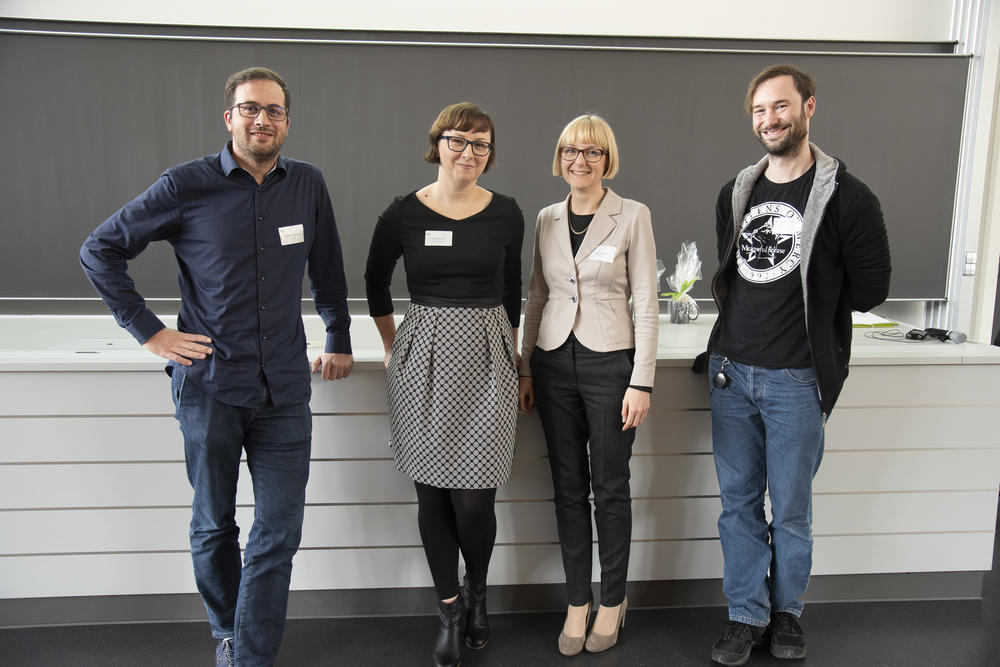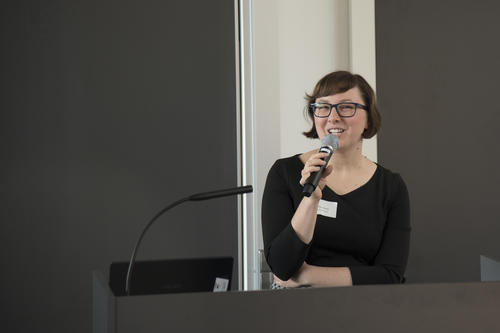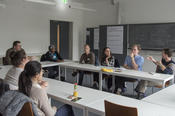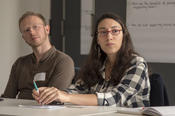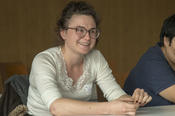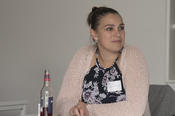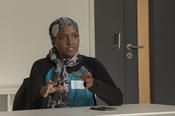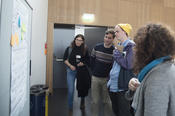Doctoral Students under One Roof
The Department of Biology, Chemistry, and Pharmacy at Freie Universität Berlin is opening a new graduate center.
Nov 04, 2019
Christian Goroncy (left), Eva Göbgen (3rd from the left), and Ludovico Sepe (right) all completed doctoral degrees in the Department of Biology, Chemistry, and Pharmacy. They talked about their career paths following their doctoral studies.
Image Credit: Marion Kuka
At the beginning of a doctoral program, new students have many questions, but little time to devote to finding the answers. In order to solve this dilemma and better organize how doctoral students get information, Dr. Alette Winter decided to go straight to the source and talk to new students in precisely this situation. Winter holds a doctorate in chemistry and is in charge of the newly founded graduate center at the Freie Universität’s Department of Biology, Chemistry, and Pharmacy.
At the beginning of October, Alette Winter invited doctoral students from the department and employees from other graduate programs at Freie Universität to workshops as part of the center’s grand opening. Around 50 people took advantage of the opportunity to meet in small groups and discuss what kind of support they would like.
Dr. Alette Winter coordinates the new graduate center in the Department of Biology, Chemistry, and Pharmacy.
Image Credit: Marion Kuka
The conceptual blueprint for the graduate center, located at Arnimalle 22, is already in place: People interested in pursuing a doctoral degree or who have already started to do so will find a wealth of information and support. The center will host special training workshops and courses for doctoral students and aims to promote ties between doctoral students and alumni that go beyond mere institutional structures and work done within research projects. The idea is for the center to complement the work of the Dahlem Research School (DRS) on a departmental level. The DRS serves as the main office for doctoral students and early-career researchers across the university.
Some 800 researchers who are currently enrolled as doctoral students in the Department of Biology, Chemistry, and Pharmacy will now be able to take advantage of this extra support. Many of them have been working on their doctorate outside of structured doctoral programs, like the ones offered through research training groups within collaborative research centers. Alette Winter explains that the new graduate school provides support for all doctoral students in the fields of biology, chemistry, biochemistry, and pharmacy.
In the workshops, it quickly became clear what kinds of problems doctoral students face on a regular basis: Where do I find the information I need? And which offers are actually relevant for me? “When I was starting out, I wasn’t sure if I really needed to take a class on writing skills or presentation techniques,” said one doctoral candidate who is about to complete her degree. She decided against taking the courses due to time restraints. But she ended up regretting it. Now she thinks advice from experienced doctoral students would have helped her make a better decision.
One of the discussion groups came to the conclusion that it definitely makes sense to have doctoral students from different working groups connect and exchange information, but not as an added requirement of the program. A “common room” might be one way to facilitate that kind of mutual support. Participants were familiar with the concept from having spent time at schools in England. The room would be a place to take a coffee break or bring your laptop to get some work done, while making it very easy to start up a conversation. Others suggested setting up a Wiki where people could find helpful information or using Slack, a web-based messaging service, to communicate with each other.
Bertram Welker knows a lot about this problem and how it affects people in a wide range of disciplines. He is in charge of doctoral programs and quality control in the humanities and social sciences at the Dahlem Research School: “If someone needs information or advice and is under pressure, they usually ask someone close by who they already know.” Welker explains that in the natural sciences experienced colleagues working in the same lab often provide new doctoral students with this kind of support, especially in international working groups.
Institutions like the graduate center can serve a double role in this respect, says Welker, “On the one hand, they help doctoral students in working groups and labs get the information and advice they need, which frees up resources and time from dealing with organizational and administrative issues. On the other hand, they also organize workshops or inform students about opportunities provided by other university offices such as the Dahlem Research School, where they can better prepare themselves for their work in a research team and thus strengthen their own professional development.”
The final topic discussed at the opening event was part of a plenary session with relevance for all doctoral students: What comes after completing the doctorate and how do I go about planning my career? Three alumni from the department’s doctoral program were there to tell about their career paths and answer questions afterward.
Alette Winter found the four-hour event incredibly informative: “It was a big help to me to hear about the perspectives and interests of doctoral students in more detail. The workshops have provided me with a lot to think about as we move forward with the graduate center.”
The original German version was published on October 22, 2019, in the campus.leben online magazine of Freie Universität Berlin.
Further Information
Dr. Alette Winter, coordinator, Graduate Center, Department of Biology, Chemistry, and Pharmacy,
Tel.: +49 30 838 66617, Email: graduate-center@bcp.fu-berlin.de
Websites
- Graduate Center, Department of Biology, Chemistry, and Pharmacy www.bcp.fu-berlin.de/en/graduiertenzentrum/index.html
- Dahlem Research School www.fu-berlin.de/en/sites/drs/index.html

